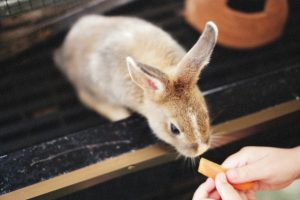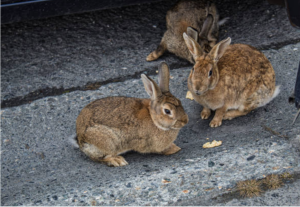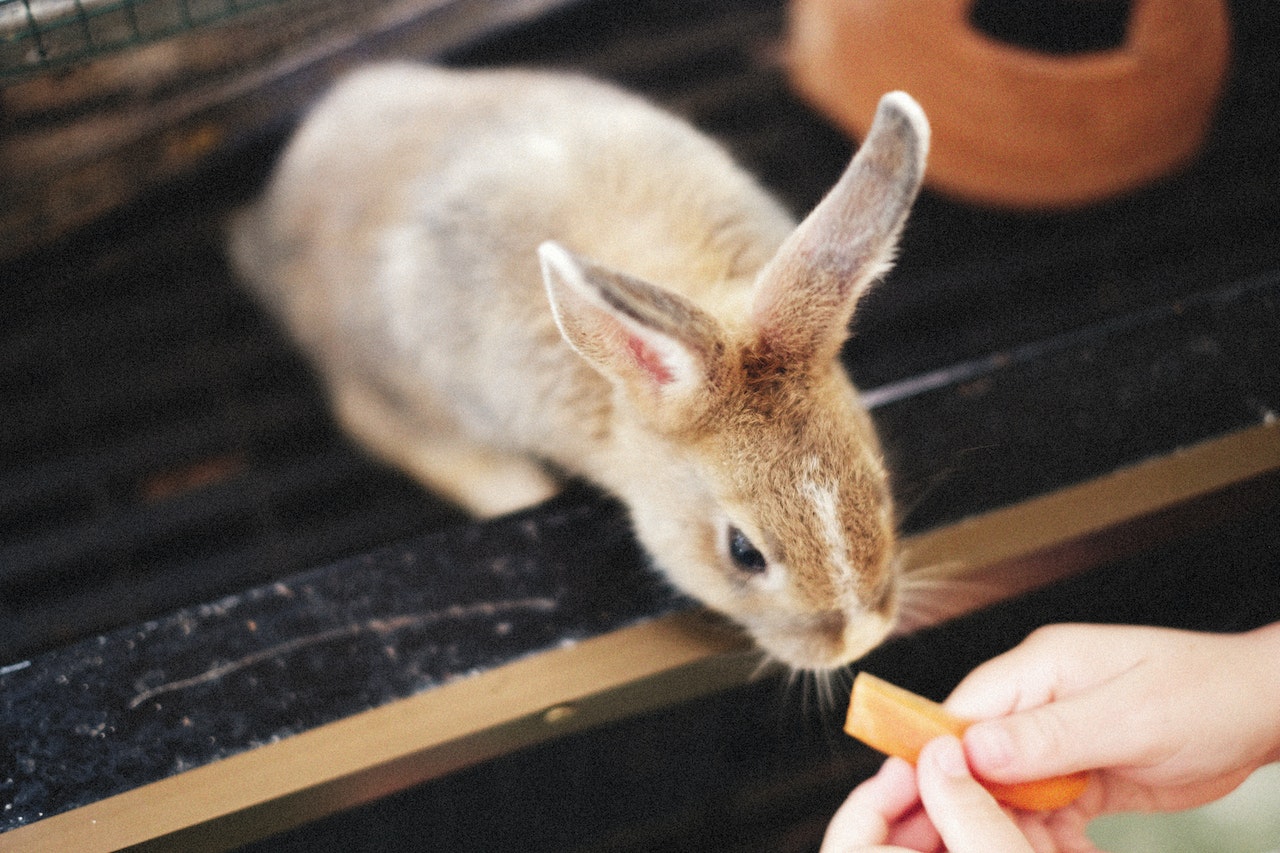If you’re a rabbit owner or considering adopting one, you might be wondering about their dietary needs and how long they can go without food.
Rabbits are adorable and fluffy creatures that require proper nutrition to thrive. In this article, we will explore the topic of how long rabbits can go without food, the amount of food they need to eat, and how often they should be fed.
How Long Can a Rabbit Go Without Food Before Dying?
Rabbits are herbivores, and their digestive systems are designed to handle a constant intake of food. Unlike humans, who can survive for weeks without eating, rabbits have a delicate balance in their gastrointestinal (GI) tract that requires a continuous flow of fibrous material to keep it functioning properly.
Typically, a rabbit should not go without food for more than 24 hours. Going without food for an extended period can lead to a condition called gastrointestinal stasis, commonly known as GI stasis.
This condition occurs when a rabbit’s digestive system slows down or stops completely, leading to a buildup of gas and other harmful substances.
How Much Food Does a Rabbit Need to Eat?
Now that we understand the importance of regular food intake for rabbits, let’s discuss how much food they need to eat. The general guideline is that a rabbit should consume approximately the size of its own body in fresh hay daily.
This roughage is essential for maintaining healthy digestion and preventing dental problems.
Apart from hay, rabbits should also be fed a variety of fresh vegetables. Leafy greens like kale, romaine lettuce, and parsley are excellent choices. It’s important to introduce new vegetables gradually to avoid digestive upsets.
Remember, rabbits have sensitive digestive systems, so any dietary changes should be made slowly.
How Often Does a Rabbit Need to Eat?
Rabbits have a unique eating pattern compared to many other animals. In the wild, they are crepuscular, which means they are most active during dawn and dusk. Therefore, it’s natural for them to graze and nibble on food throughout the day and night.
To mimic their natural eating habits, rabbits should have access to food at all times. This doesn’t mean you should fill their bowl with an excessive amount of food.
Instead, make sure their hay rack is always stocked, and provide fresh vegetables in appropriate portions twice a day. This ensures that they can eat whenever they feel hungry, promoting healthy digestion and preventing GI stasis.
What Does a Rabbit Need to Eat?
Apart from the previously mentioned fresh hay and leafy greens, rabbits also require a small amount of high-quality rabbit pellets as part of their diet.
These pellets are specially formulated to provide the necessary vitamins and minerals that may be lacking in their hay and vegetable diet.
However, it’s important to note that pellets should be given in moderation. Too many pellets can lead to obesity and other health problems. As a general rule, provide approximately one-quarter cup of pellets per five pounds of body weight per day.
How Long Can Rabbits Go Without Water?
Just as food is crucial for a rabbit’s survival, water is equally important. Without adequate hydration, rabbits can quickly become dehydrated, leading to serious health issues.
While rabbits can survive longer without water than without food, it’s essential to provide them with fresh water at all times.
A rabbit’s water bottle or bowl should be cleaned and refilled daily to ensure cleanliness and prevent bacterial growth. Some rabbits have a preference for drinking from bowls, while others prefer water bottles with sipper tubes.
Observe your rabbit’s preference and provide them with the appropriate water source.
GI Stasis in More Detail – How Long Can a Rabbit Go Without Food?
GI stasis is a severe condition that can be life-threatening for rabbits. It occurs when the normal movement of food and gas through the digestive system slows down or stops completely.
This can be caused by factors such as a lack of fiber in the diet, dehydration, stress, pain, or underlying medical conditions.
Signs of GI stasis in rabbits include a decreased appetite, reduced or no fecal output, lethargy, hunched posture, and a bloated abdomen. If you notice any of these symptoms, it’s crucial to seek veterinary attention immediately.
Prompt intervention can save your rabbit’s life and prevent further complications.
How Often to Feed and Water Rabbits
To summarize, rabbits should have access to fresh hay at all times, as well as a variety of fresh vegetables twice a day. Pellets should be given in moderation, and water should be available at all times.
By following these guidelines and paying attention to your rabbit’s eating habits, you can help ensure their overall health and well-being.

Remember, each rabbit is unique, and their dietary needs may vary. Consult with a veterinarian who specializes in exotic animals or rabbits for specific dietary recommendations based on your rabbit’s age, size, and overall health.
How Long Can a Rabbit Go Without Hay? – How Long Can a Rabbit Go Without Food?
Hay is an essential part of a rabbit’s diet, providing the necessary fiber for proper digestion. So, how long can a rabbit go without hay? Ideally, a rabbit should never be without access to fresh hay.
It should be available at all times to support their digestive health and prevent issues like gastrointestinal stasis. However, in situations where hay is temporarily unavailable, a rabbit may survive for a short period, such as a few hours or up to a day.
Nonetheless, it is crucial to ensure a steady supply of hay to keep your furry friend happy and healthy.
How Long Can a Rabbit Go Without Eating After Surgery?
After undergoing surgery, it’s common for rabbits to experience a decreased appetite due to the stress and discomfort associated with the procedure. However, it’s vital to encourage eating as soon as possible to aid in their recovery.
Typically, rabbits should start eating within 24 to 48 hours after surgery. If your rabbit shows no interest in food beyond this timeframe, it’s essential to consult your veterinarian immediately.
Delayed eating after surgery can lead to complications, and your vet can provide guidance on how to stimulate their appetite and ensure a swift recovery.
How Long Can Rabbits Live Without Food and Water?
Rabbits are highly dependent on a regular intake of food and water to maintain their well-being. While their survival instincts and unique physiology enable them to endure harsh conditions, the absence of food and water for an extended period can have severe consequences.
Generally, rabbits can survive for a few days, up to a week, without food and water. However, this should never be intentionally tested or prolonged, as it can cause irreversible damage to their health and even be fatal.
Always provide your rabbit with access to fresh food and water to ensure their vitality.

I Forgot to Feed My Rabbit for a Day
We all make mistakes, and forgetting to feed your rabbit for a day can happen. While it’s not ideal, the good news is that a healthy rabbit can usually tolerate missing a single meal without significant consequences.
Rabbits have a unique digestive system designed to handle intermittent fasting in the wild. However, it’s essential to rectify the situation promptly and ensure your rabbit has access to fresh food and water.
Regular feeding and adherence to their dietary needs will help maintain their health and happiness.
How Long Can a Rabbit Live with GI Stasis?
Gastrointestinal stasis, or GI stasis, is a condition that affects a rabbit’s digestive system, leading to a slowdown or complete halt in food movement. GI stasis is a severe and potentially life-threatening condition that requires immediate veterinary attention.
Without intervention, a rabbit’s health can deteriorate rapidly. Time is of the essence when dealing with GI stasis, and seeking veterinary care promptly can significantly improve the chances of a positive outcome.
Treatment may involve medications, fluids, dietary adjustments, and supportive care to get the rabbit’s digestive system back on track.
How Long Can a Wild Rabbit Go Without Eating?
Wild rabbits have adapted to survive in challenging environments, where food availability may fluctuate. These resilient creatures have a higher tolerance for going without food compared to their domestic counterparts.
While the exact duration can vary based on individual circumstances, a wild rabbit can typically go without eating for several days or even up to a week.
Read also – The spiritual meaning of rabbit crossing your path
However, it’s important to note that this survival mechanism should not be romanticized or used as a standard for domestic rabbits. Pet rabbits require regular feeding to maintain their health, and providing a steady supply of food is crucial to their well-being.

FAQ
What happens if a rabbit doesn’t eat for 24 hours?
If a rabbit doesn’t eat for 24 hours, it can lead to gastrointestinal stasis, a condition where the digestive system slows down or stops. This can result in a buildup of gas and other harmful substances, potentially leading to serious health complications.
How long can a rabbit go without water or food?
While rabbits can survive longer without water than without food, it is crucial to provide them with fresh water at all times. Without water, a rabbit’s health can deteriorate quickly, and dehydration can lead to serious health issues.
How long can a baby rabbit go without food?
Baby rabbits, also known as kits, are more vulnerable and have higher nutritional requirements than adult rabbits. They should not go without food for more than a few hours. It’s important to ensure that they are nursing or being fed an appropriate milk replacement formula regularly.
Do rabbits need to eat all day?
Rabbits have a unique eating pattern and should have access to food throughout the day. They are natural grazers, and their digestive systems require a continuous flow of food to stay healthy. Providing them with a steady supply of fresh hay and vegetables supports their well-being.
Is it OK to feed rabbits once a day?
Feeding rabbits once a day may not be ideal for their digestive health. They require a constant supply of fresh hay and should have access to fresh vegetables twice a day. This helps maintain their digestive system and prevents issues like gastrointestinal stasis.
How much does 1 rabbit eat a day?
On average, a rabbit should consume an amount of fresh hay that is equivalent to its own body size daily. Additionally, they should be given approximately one-quarter cup of high-quality rabbit pellets per five pounds of body weight per day. Fresh vegetables should be offered in appropriate portions twice a day.
In conclusion – How Long Can a Rabbit Go Without Food?
understanding a rabbit’s dietary needs is crucial for their overall health and well-being. Providing them with a balanced diet, ample fresh water, and access to food throughout the day is essential. Remember, a well-nourished and happy rabbit is a recipe for a long and joyful companionship.
